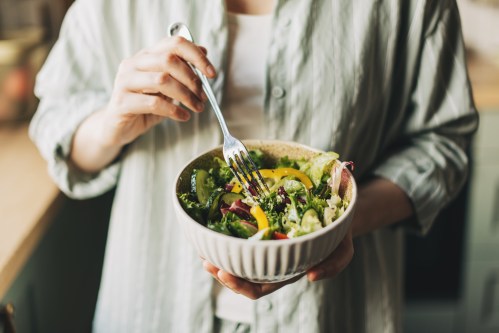Our editors independently select these products. Making a purchase through our links may earn Well+Good a commission
If you've ever ordered a cheesy slice of pizza or bowl of creamy pasta at your favorite restaurant, but have lactose intolerance (i.e., the inability to digest a sugar in dairy called lactose), you've likely asked yourself the question: "What happens when I eat cheese but really shouldn't?" Sure, eating milk products leads to temporary stomach cramping, gas, and diarrhea, but are there any long-term effects of indulging in forbidden cheese now and then?
Experts in This Article
board-certified gastroenterologist and adjunct assistant professor at Touro College of Osteopathic Medicine
gastroenterologist, nutrition and lifestyle medicine specialist, and founder of Sarah Robbins MD
I spoke with two gut health experts to learn more about what happens when you eat cheese if you're lactose intolerant, the long-term effects of eating dairy when you probably shouldn't, and whether certain varieties of cheese are easier on the gut—because, we know, it's hard to resist the occasional night cheese.
Can you eat cheese if you're lactose intolerant?
The short answer? Sometimes. But before we get into why, it's helpful to know how lactose intolerance happens in the first place. According to Niket Sonpal, MD, a gastroenterologist and adjunct professor of clinical medicine at Touro College of Medicine, "Our bodies have a certain amount of enzymes known as lactase that live in our small intestines" to help us digest the milk sugar lactose.1
But sometimes, these levels of lactase naturally decline, either due to genetics, age, or underlying gastrointestinal (GI) conditions, says Sarah Robbins, MD, a gastroenterologist and nutrition specialist in British Columbia, Canada. (This could explain why you might've been able to eat milk and cheese with no problem as a kid but it upsets your stomach as an adult.) It's pretty common, too: Almost 70 percent of the world's population is considered lactose intolerant, she adds. The severity of intolerance, however, is a sliding scale.
Essentially, the fewer lactase enzymes in your gut, the more severe your intolerance, and the more intense your gut issues will be when you eat dairy. "The amount of enzyme you have translates to the amount of dairy you can tolerate," says Dr. Robbins. "It's not an all-or-nothing situation. Some people have almost no enzymes so their tolerance is very low."
Enzymes aside, the type of cheese you eat can also determine how well you'll digest it. It turns out that some cheese varieties have less lactose because bacteria help break it down during the aging and fermentation process, Dr. Robbins adds. Meaning, the more aged the cheese, the less lactose it's likely to have. (Good news for the cheese lovers!)
So ultimately: Yes, you can eat cheese while lactose intolerant if you keep the above in mind. Maybe do a bit of experimenting to test your level of intolerance and which cheese is kindest to your gut. Both Drs. Sonpal and Robbins say this self-testing is harmless, and actually what they'd recommend to do if you suspect an intolerance in the first place. Plus, it won't cause long-term damage to the gut, save for a few exceptions.
What are the long-term effects of eating dairy with an intolerance?
Both Drs. Sonpal and Robbins say that the gut effects of eating dairy when you're lactose intolerant are fairly short-lived—about 24 hours or so. "Once that sugar has been processed, digested, and passed out the other end, it really doesn't have downsides," says Dr. Robbins. "You're not creating lasting damage in the gut."
And, while it may feel like it, there is actually "no long-term damage done to your gut or intestinal lining," when you eat dairy while lactose intolerant, says Dr. Robbins. However, there may be other consequences to eating dairy when it doesn't agree with you that you might not expect—unless you make some small tweaks to your daily habits.
There are some exceptions, though. One is if you have an underlying GI condition like inflammatory bowel disease (IBD) and develop dairy issues as a result, called secondary lactose intolerance. In this case, you may experience damage to your intestinal lining from eating dairy. However, if you and your healthcare provider successfully manage your GI condition with medication and other lifestyle changes, you may be able to reintroduce dairy with fewer issues.
Even if you don't have a GI condition but choose to eat tons of milk and cheese every day, there are some other potential downsides to note. Yes, your gut will be fine, but chronic diarrhea can lead to nutrient deficiencies—calcium and vitamin D in this case—which can increase your risk for things like osteopenia (i.e., bone density loss) and muscle weakness.2,3
To avoid these effects—and the temporary stomach pain that often comes with eating too much cheese—you may want to cut down your overall intake. And if you end up being allergic to dairy (that is, your body's immune system negatively reacts to milk's protein rather than its sugar), you'll need to avoid dairy altogether.
"There could be long-term effects to your gut if you're allergic to dairy, not just intolerant," says Dr. Robbins. But you'll often experience other symptoms along with stomach issues, like hives, itching and swelling, shortness of breath, and others common with food allergies, she adds. Your healthcare provider can help determine whether you're dealing with an allergy or intolerance through different tests—like bloodwork or the hydrogen breath test (which helps diagnose lactose intolerance).
Some low-lactose cheeses to try, instead
If you just can't resist (I get it!) and you have only a mild intolerance, certain types of cheese have less lactose. So, you might not have to cut cheese out of your life altogether. Dr. Sonpal says to go for things that are more aged, as they might be easier on the gut, including:
- Havarti
- Muenster
- Aged brie
- Certain cheddars (like sharp cheddar)
- Provolone
- Parmesan
"There are also small dairies that will create things (like cheese) that are going to be low in lactose," says Dr. Sonpal. Plus, "the more aged [the cheeses are], the more lactose gets worked through," and out of the final products, he adds. The older, the better.
Cheeses that tend to be higher in lactose content are often softer and milkier in texture, such as mozzarella, burrata, ricotta, and cottage cheese. You may want to steer clear of these—unless you have a backup plan to mitigate their rumbly effects.
And, while it may feel like it, there is actually "no long-term damage done to your gut or intestinal lining," when you eat dairy while lactose intolerant"
Other tips to keep in mind
Along with being mindful of the types of cheese you reach for, here are some other strategies that might make treating yourself a little easier:
- Try a lactase enzyme supplement. Dr. Robbins recommends keeping over-the-counter lactase enzyme supplements (like Lactaid) on hand since they are a safe and effective way to manage mild intolerance. "Take it ahead of time and use it intermittently for special occasions," like going out to dinner or enjoying dessert, she adds. It may not completely erase your symptoms, but it can help reduce them.
- Look for lactose-free dairy products. The brand Lactaid sells milk, cheese, and other dairy products that might be easier on your stomach. Many grocery stores carry these options.
- Eat dairy products that are naturally lower in lactose. "Yogurt tends to be lower in lactose because of the good bacteria killing off the sugar during the fermentation process," says Dr. Robbins. Aged cheeses and goat cheese also tend to have less, as well.
- Find other sources of calcium and vitamin D. Because you're at risk for certain vitamin deficiencies when you limit dairy, try to fill up on other high-calcium and vitamin D-rich foods, such as spinach, broccoli, oranges, salmon, and fatty fish.
Another thing to keep in mind: Dr. Robbins says sometimes it's not lactose but the fat in dairy that leads to stomach upset. "Some people are actually very poorly intolerant to fat and rich meals, so it's not lactose bothering them but high-fat versus low-fat dairy products." She recommends doing some journaling and self-testing to figure this out.
The bottom line
Cheese aficionados, rejoice. It's still possible to eat cheese with a lactose intolerance, though it will likely depend on how severe your intolerance is, the type of cheese you eat, and how much you consume. So, for example, you may be able to enjoy sprinkles of parmesan cheese on your pasta or soup, but maybe not a full-course meal of pizza, mozzarella sticks, and ice cream. (Though we're not judging if you go for it one night!)
And if you don't know whether you have a true lactose intolerance? Dr. Sonpal recommends a strategy he calls "lactose and chill." Go dairy-free for three days and then spend one day eating only dairy while relaxing at home. "If you're in pain and have to run to the bathroom, you likely have an intolerance," he adds.
- “Lactase.” Lactase - an Overview | ScienceDirect Topics, www.sciencedirect.com/topics/biochemistry-genetics-and-molecular-biology/lactase. Accessed 5 Apr. 2025.
↩︎ - Gorospe, Emmanuel C, and Amy S Oxentenko. “Nutritional consequences of chronic diarrhoea.” Best practice & research. Clinical gastroenterology vol. 26,5 (2012): 663-75. doi:10.1016/j.bpg.2012.11.003 ↩︎
- Varacallo MA, Seaman TJ, Jandu JS, et al. Osteopenia. [Updated 2023 Aug 4]. In: StatPearls [Internet]. Treasure Island (FL): StatPearls Publishing; 2025 Jan-. Available from: https://www.ncbi.nlm.nih.gov/books/NBK499878/ ↩︎
Sign Up for Our Daily Newsletter
Get all the latest in wellness, trends, food, fitness, beauty, and more delivered right to your inbox.
Got it, you've been added to our email list.











